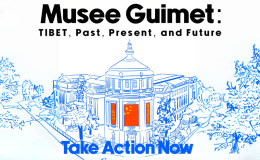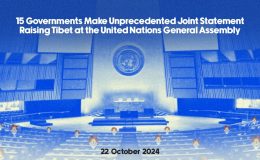International Tibet Network expresses shock and outrage at the news that Nobel Peace Prize winner Liu Xiaobo has been diagnosed as gravely ill while unjustly detained by China.
Staff of the International Tibet Network [1] Secretariat are deeply distressed to learn that Liu Xiaobo has had a late diagnosis of liver cancer while in detention in a Chinese prison. [2] Tibet Network calls for his immediate, unconditional release, and for him and his family to be permitted to travel to the country of their choice for his urgent treatment.
“The Tibet movement has long admired and supported Liu Xiaobo, and stand in awe of his courage and integrity”, said Tenzin Jigdal, International Coordinator of Tibet Network Secretariat. “We are appalled to hear of his diagnosis with terminal cancer of the liver and urge governments around the world to urgently demand his unconditional release and the freedom to travel with his family wherever he wishes. Governments must also hold China to account for how – despite claims that prisoners’ health is closely monitored – he has reached this critical state.”
Liu Xiaobo, writer, professor and human rights defender, has been a long time supporter of Tibet, openly expressing support for greater freedom for the Tibetan people and championing democratic reform in China. [3] In 1996 he was sentenced to three years in a labour camp for writing a joint letter to China’s then President Jiang Zemin supporting Tibetan self-determination and calling for dialogue with the Dalai Lama and is believed to be the first Chinese person to be sentenced for speaking up for Tibet. [4] In March 2008, as the Tibetan Plateau was swept by uprisings, he was a co-author and signatory of “Twelve Suggestions for Dealing with the Tibetan Situation”. [5]
The circumstances of Liu’s illness are a profound reminder of the case of highly respected Tibetan lama and political prisoner, Tenzin Delek Rinpoche, who died in custody in July 2015. Tenzin Delek Rinpoche served over 13 years imprisoned for a crime he did not commit. He was known to be in extremely poor health with a serious heart condition and high blood pressure, and was eligible for medical parole, for which his family had made an official application in 2014. The specific cause of his death remains unknown. [6]
Nyima Lhamo, the niece of Tenzin Delek Rinpoche said today: “The lack of proper treatment given China’s prior knowledge of Liu Xiaobo’s medical condition a month ago is not only a clear indication of China’s sheer lack of respect for freedom and human rights but also Liu as a human. This brings back terrible memories of the ill-health and subsequent death in China’s custody of another brave and principled human rights defender, my uncle Tenzin Delek Rinpoche. Despite China’s claims that prisoners are well cared for, it is clear that the State has learned nothing from my uncle’s unnecessary and tragic death. I pray for Liu Xiaobo and appeal to governments of the world to step forward and ensure this is the last time this can happen. As fellow human beings, we all are morally obliged to ensure that this heinous crime of the Chinese government doesn’t go unnoticed.”
Liu Xaiobo’s current 11-year prison sentence was handed down a year after his arrest on 8 December 2008 for his part in writing and promoting ‘Charter 08’, which calls for legal reforms, democracy and protection of human rights in China. [7] Before his sentencing he said in his ‘Final Statement’, “Freedom of expression is the basis of human rights, the source of humanity and the mother of truth. To block freedom of speech is to trample on human rights, to strangle humanity and to suppress the truth.” [8]
Liu’s wife, Liu Xia has lived under constant surveillance since her husband’s arrest and been under house arrest since shortly after it was announced that he had won the Nobel Peace Prize. In a video circulating on social media, she is seen on a video call tearfully saying that neither surgery nor radiotherapy or chemotherapy were possible for her husband. [9]
When Liu Xiaobo was awarded the Nobel Peace Prize in December 2010, Tibet Network said that the Nobel Committee “has illuminated the human and political rights of the people in China and Tibet and created a sense of hope. We now expect governments around the world to follow the Committee’s moral leadership, to press China’s leaders to release Liu Xiaobo and all the heroic Chinese and Tibetan human rights defenders that remain in prison, and urge them to take meaningful steps to implement the political and human rights reforms that these brave advocates are risking their lives to promote.”
Notes:
- International Tibet Network is a global coalition of Tibet-related non-governmental organisations dedicated to ending human rights violations in Tibet and to working actively to restore the Tibetan people’s right under international law to determine their future political, economic, social, religious and Cultural status. See www.tibetnetwork.org for more information.
- He is currently on “medical parole” in No. 1 Hospital of the China Medical University in Shenyang, Liaoning Province.
- Liu Xiaobo’s essay “The Right of Self-government” in 2000 supported the Dalai Lama’s position on Tibetan autonomy: “The Dalai Lama raised the demands of Tibet’s autonomy, not only in moral terms, but also in reality expressed the sincerity of peace negotiations.” In Chinese http://mqxd.org/archives/215 (Google Translate).
- See September 1996 of this entry on the Central Tibetan Administration’s website http://tibet.net/important-issues/sino-tibetan-dialogue/an-overview-of-sino-tibetan-dialogue/sino-tibetan-dialogue-confrontation-1994-2001/
- See https://www.hrw.org/news/2008/03/21/twelve-suggestions-dealing-tibetan-situation
- https://tibetnetwork.org/tenzin-delek-rinpoche-death-in-a-chinese-prison/. See also a recent UN experts’ report relating to the death of Tenzin Delek Rinpoche and China’s treatment of his sister, Dolkar Lhamo, and niece, Nyima Lhamo. https://spcommreports.ohchr.org/TMResultsBase/DownLoadPublicCommunicationFile?gId=22870
- Background and translations of Liu Xiaobo’s letter to Jiang Zemin and the Charter ’08 text and signatories are available on High Peaks, Pure Earth at http://highpeakspureearth.com/2008/charter-08/
- Liu Xiaobo’s ‘I have No Enemies: My Final Statement’ was read at the Nobel Prize ceremony https://www.nobelprize.org/nobel_prizes/peace/laureates/2010/xiaobo-lecture.html by Liv Ullman. Translation by Human Rights in China.
- “Chinese Nobel rights activist Liu Xiaobo’s cancer beyond surgery: wife”
https://www.reuters.com/article/us-china-rights-idUSKBN19I0C9





